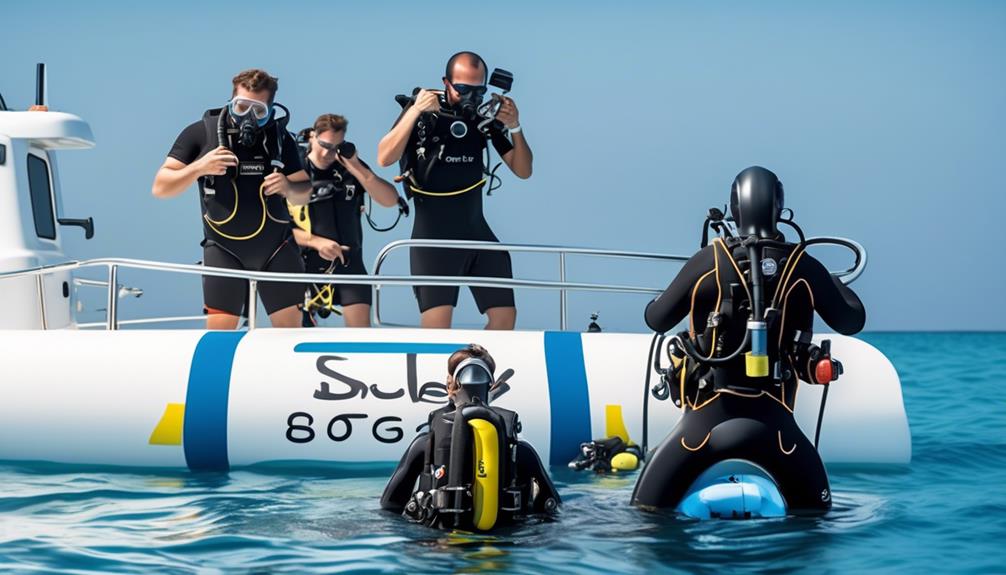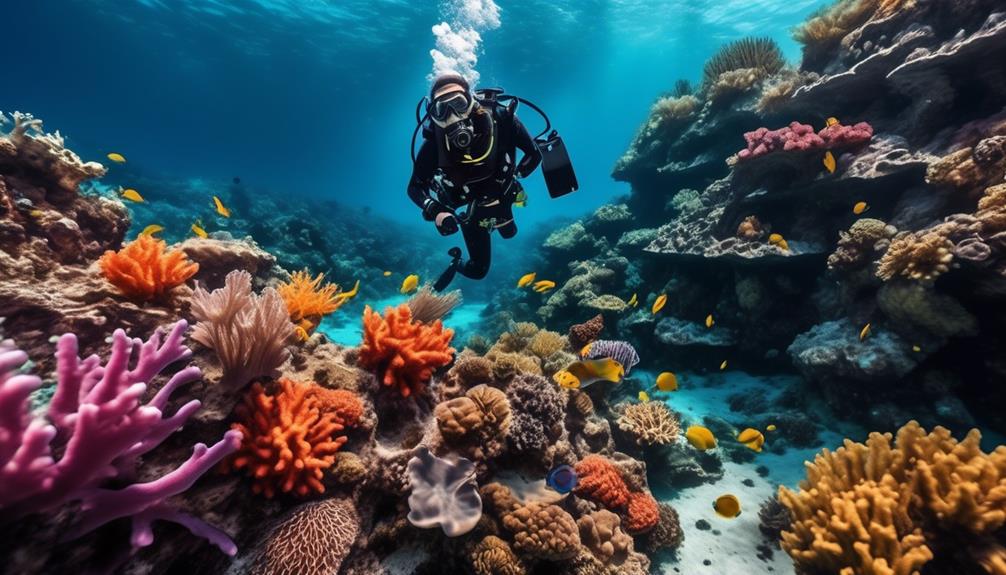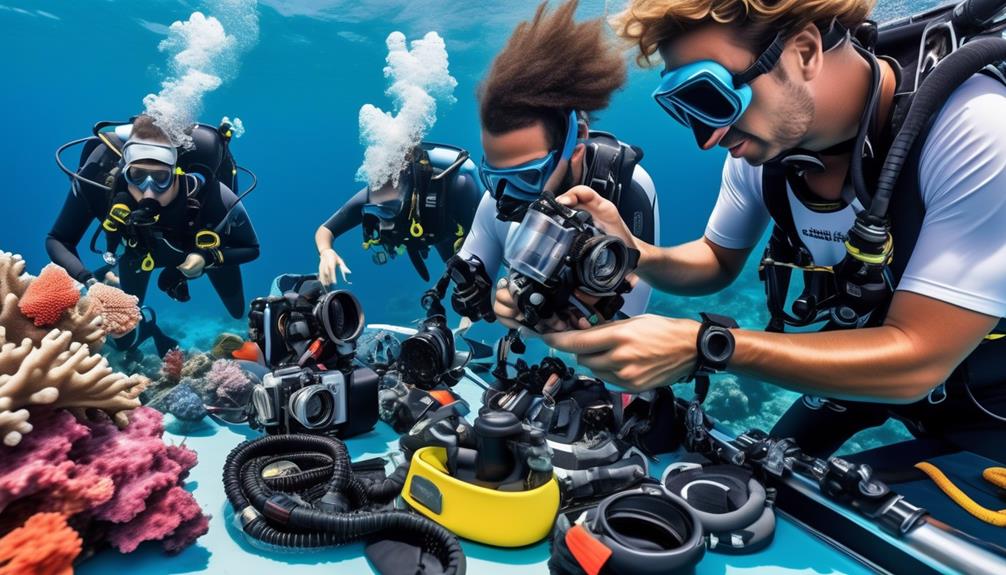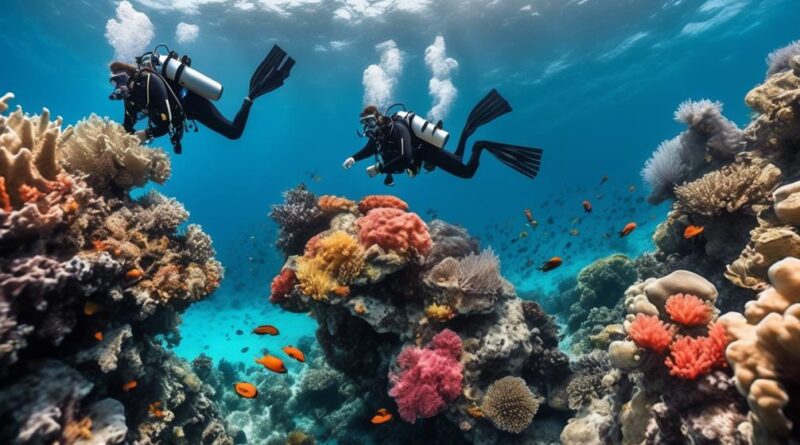7 Top Tips for Scuba Diving Adventure Cruises
Are you ready to take the plunge and explore the mesmerizing world beneath the waves? Scuba diving adventure cruises offer an unparalleled opportunity to immerse yourself in the wonders of the ocean, but preparation is key to ensuring a safe and fulfilling experience.
From choosing the right adventure cruise to mastering underwater photography skills, these top tips will equip you with the knowledge and skills needed to make the most of your scuba diving escapades.
Whether you're a novice diver or a seasoned enthusiast, these insights will help you navigate the challenges and maximize the rewards of your underwater expeditions.
Choosing the Right Adventure Cruise
When selecting the right adventure cruise for your scuba diving excursion, consider the level of experience and expertise offered by the cruise operators. Adventure destinations play a crucial role in determining the excitement and diversity of your scuba diving experience. Look for adventure cruises that offer access to a variety of destinations, from vibrant coral reefs to thrilling underwater caves. This ensures that you have the opportunity to explore different marine ecosystems and encounter a wide range of marine life.
Cruise accommodations are another essential factor to consider. Opt for adventure cruises that provide comfortable and well-equipped accommodations to ensure a relaxing and enjoyable trip. Whether you prefer a cozy cabin or a luxurious suite, the right cruise accommodation can significantly enhance your overall experience. Additionally, amenities such as onboard dining options, entertainment facilities, and relaxation areas should also be taken into account when choosing the right adventure cruise for your scuba diving trip.
The expertise of the cruise operators is vital for a safe and fulfilling scuba diving adventure. Look for operators with experienced dive guides and instructors who can provide valuable insights and ensure your safety throughout the excursion. Their knowledge of the local marine life and diving conditions can greatly enrich your diving experience. Moreover, experienced operators can offer specialized diving opportunities, such as night dives or drift dives, adding an extra layer of excitement to your scuba diving adventure.
Packing Essentials for Scuba Diving
Considering the level of experience and expertise offered by the cruise operators, you should pack essential gear for scuba diving to ensure a safe and enjoyable underwater experience.
When preparing for your scuba diving adventure, make sure to pack your scuba gear, including your wetsuit, mask, snorkel, fins, dive computer, and regulator. It's crucial to check your scuba gear before your trip to ensure it's in good working condition. Verify that your regulator is functioning properly, and your dive computer is charged and ready for use. Additionally, inspect your wetsuit for any tears or damage that may affect its performance underwater.
In addition to your scuba gear, don't forget to pack your travel documents, such as your passport, dive certification card, and any required permits for the dive sites you'll be visiting. It's a good idea to make copies of these documents and keep them in a separate bag in case the originals get lost or damaged.
When it comes to packing tips, consider using a dedicated dive bag to keep all your scuba gear organized and protected during travel. Ensure that any sharp objects, like dive knives or shears, are securely packed to prevent damage to other items in your luggage. Lastly, remember to pack any necessary equipment maintenance tools, such as O-rings and lubricant, to address any minor issues that may arise during your trip.
Safety Precautions for Diving Excursions

To ensure a safe and enjoyable diving experience, prioritize safety precautions during your diving excursions. When it comes to scuba diving, safety should always be the top priority. Here are some essential safety precautions to consider before embarking on your diving adventure:
- Emergency Procedures: Familiarize yourself with emergency procedures before diving. Knowing how to handle emergency situations such as equipment malfunctions, rapid ascents, or loss of your dive buddy is crucial. Stay calm and follow the appropriate protocols to ensure a safe resolution to any unexpected events.
- Dive Buddy System: Always adhere to the dive buddy system. Having a reliable dive buddy significantly enhances safety during a dive. You and your buddy are responsible for each other's safety, so proper communication and constant awareness of each other's well-being are vital. In the event of an emergency, your dive buddy can provide assistance and support, making it a fundamental aspect of safe diving.
- Equipment Check: Conduct a thorough equipment check before every dive. Ensure that all your gear is in proper working condition and that you're familiar with its operation. This includes checking your air supply, gauges, and any additional equipment you may be using. By doing so, you're actively mitigating the risk of potential equipment-related issues underwater.
Choosing the Best Dive Sites
When selecting dive sites, prioritize those that align with your skill level and interests to maximize your enjoyment and safety during your diving excursions. Exploring marine life is often a top priority for many divers. Look for dive sites known for vibrant coral reefs, diverse fish species, and the possibility of encountering larger marine creatures such as sharks, turtles, or rays. If you're an avid photographer, consider sites with unique underwater topography, like caves, walls, or wrecks, which can provide stunning backdrops for your photos.
Dive site exploration should also take into account the diving conditions. Check the water temperature, visibility, and current strength to ensure they match your comfort and experience levels. For beginners, calm and clear waters with minimal currents are ideal, while more experienced divers might seek out sites with stronger currents for an added thrill. Additionally, consider the depth of the dive sites and whether they align with your certification and experience.
It's essential to research and understand the underwater topography of potential dive sites. Some divers prefer dramatic drop-offs and underwater cliffs, while others enjoy shallow reefs that allow for longer bottom times. By choosing dive sites that cater to your preferences and abilities, you'll have a more fulfilling and safe diving experience.
Enhancing Underwater Photography Skills

Improve your underwater photography skills by experimenting with different lighting techniques and camera settings to capture the vibrant marine life and unique underwater landscapes effectively.
When diving into the depths of the ocean, mastering the art of underwater photography can add a whole new dimension to your scuba diving adventures. To enhance your skills and capture stunning underwater images, consider the following tips:
- Experiment with Lighting Techniques: Underwater photography relies heavily on lighting. Try using natural light to your advantage by positioning yourself in a way that allows the sunlight to illuminate your subject. Additionally, consider using artificial lighting sources such as strobes or video lights to enhance colors and details in your photos.
- Master Composition Tips: To create visually compelling images, focus on your composition. Pay attention to the positioning of your subjects within the frame, and consider the rule of thirds to create balanced and engaging photographs.
- Capture Underwater Wildlife and Marine Landscapes: The ocean is teeming with diverse marine life and captivating underwater landscapes. Take the time to patiently observe your surroundings and look for unique opportunities to capture the beauty of marine creatures and the stunning underwater environment.
Navigating Diving Challenges
Mastering essential diving skills is crucial for successfully navigating challenges underwater. When faced with underwater communication challenges, it's important to use hand signals effectively to convey messages to your dive buddy. Practice these signals beforehand to ensure smooth communication during the dive. Remember to establish eye contact with your buddy before descending and frequently check on each other throughout the dive to ensure safety.
Dive buddy etiquette is essential for a successful diving experience. Always stay close to your buddy and maintain clear visibility. Discuss and plan the dive beforehand, including emergency procedures and signals. It's crucial to be aware of your buddy's location at all times and to communicate effectively through pre-dive briefings and underwater signals. Additionally, be considerate of your buddy's air supply and dive time to avoid any unnecessary risks.
In challenging underwater conditions, maintaining calm and focused communication with your dive buddy is key. Practice active listening and be ready to assist your buddy if needed. Remember to stay relaxed, conserve energy, and rely on your training to overcome any obstacles.
Making the Most of Dive Excursions

To fully maximize your dive excursions, it's crucial to apply the essential diving skills and buddy etiquette you've mastered, ensuring a safe and enjoyable underwater adventure. Here are some tips to help you make the most of your dive excursions:
- Stay Calm and Focused: Underwater navigation can be challenging, especially in unfamiliar dive sites. Stay calm, focus on your surroundings, and trust in your training. By maintaining a clear head and staying attentive to your surroundings, you'll be able to navigate effectively and make the most of your dive experience.
- Plan Ahead for Dive Trips: Effective dive trip planning is essential for making the most of your excursions. Research the dive sites in advance, take note of any specific features or marine life you'd like to see, and discuss your preferences with your dive guide. By planning ahead, you'll be better prepared to make the most of your time underwater and ensure that you don't miss out on any key attractions.
- Communicate with Your Dive Buddy: Clear communication with your dive buddy is key to maximizing your dive excursions. Discuss your dive plan, signals, and emergency procedures before descending. During the dive, maintain visual contact with your buddy and communicate any important observations. A strong partnership with your dive buddy will enhance the overall experience and safety of your dive excursions.
Environmental Conservation Efforts
You can contribute to environmental conservation efforts by practicing responsible diving habits and supporting marine protection initiatives. When diving, always remember to avoid touching or disturbing marine life. Keep a safe distance to protect delicate coral reefs and underwater ecosystems. Be mindful of your equipment to prevent accidental damage to the underwater environment. Responsible diving also includes properly disposing of any waste and being cautious with your movements to avoid stirring up sediment that can harm marine life.
Supporting marine protection initiatives is crucial for the conservation of underwater ecosystems. Look for dive operators and cruise companies that prioritize sustainable tourism practices. Choose eco-friendly dive operators who adhere to guidelines for responsible diving and actively participate in marine life protection programs. By patronizing these businesses, you're contributing to the conservation of marine environments.
Marine life protection is a shared responsibility among divers, tour operators, and local communities. Take the time to learn about the marine life in the areas you visit and respect any guidelines or regulations in place to protect them. Report any observed environmental damage or harmful practices to the local authorities or relevant conservation organizations. Your active involvement in promoting sustainable tourism practices and marine life protection can make a positive impact on the underwater world.
Frequently Asked Questions
What Are Some Common Medical Conditions That Could Prevent Someone From Scuba Diving, and How Can They Be Managed While on an Adventure Cruise?
If you have asthma, allergies, or other medical conditions, they could restrict you from scuba diving. Managing asthma effectively and ensuring allergies are under control are crucial to safely enjoy your adventure cruise.
Are There Any Specific Regulations or Restrictions for Bringing Diving Equipment on Board an Adventure Cruise?
When bringing diving equipment on board an adventure cruise, be aware of regulations and equipment restrictions. Check cruise regulations beforehand to ensure compliance. Some cruises may have specific rules regarding the type and amount of diving equipment allowed.
What Are Some Tips for Managing Seasickness While on a Diving Excursion?
To manage seasickness on a diving excursion, focus on preventing nausea by using breathing techniques and targeting acupressure points. Stay hydrated, avoid heavy meals, and keep your eyes on the horizon to help minimize motion sickness.
How Can Divers Contribute to Marine Conservation Efforts While on a Diving Adventure Cruise?
To contribute to marine conservation efforts while on a diving adventure cruise, you can follow sustainable practices, support local conservation projects, and participate in reef cleanups. Prioritize dive safety and be familiar with emergency procedures to protect the marine environment.
Are There Any Cultural or Etiquette Considerations to Keep in Mind When Diving in Different Regions During an Adventure Cruise?
When diving in different regions during an adventure cruise, it's important to be aware of cultural considerations and etiquette guidelines. Respect local customs, follow diving regulations, and be mindful of the impact your presence may have on the environment.
Conclusion
So, if you're ready for an unforgettable scuba diving adventure cruise, remember to:
- Choose the right cruise
- Pack your essentials
- Prioritize safety
- Choose the best dive sites
- Enhance your photography skills
- Navigate challenges
- Make the most of every dive excursion
And don't forget to do your part in environmental conservation efforts.
With these top tips in mind, you'll be well-prepared for an amazing underwater experience on your next adventure cruise.
